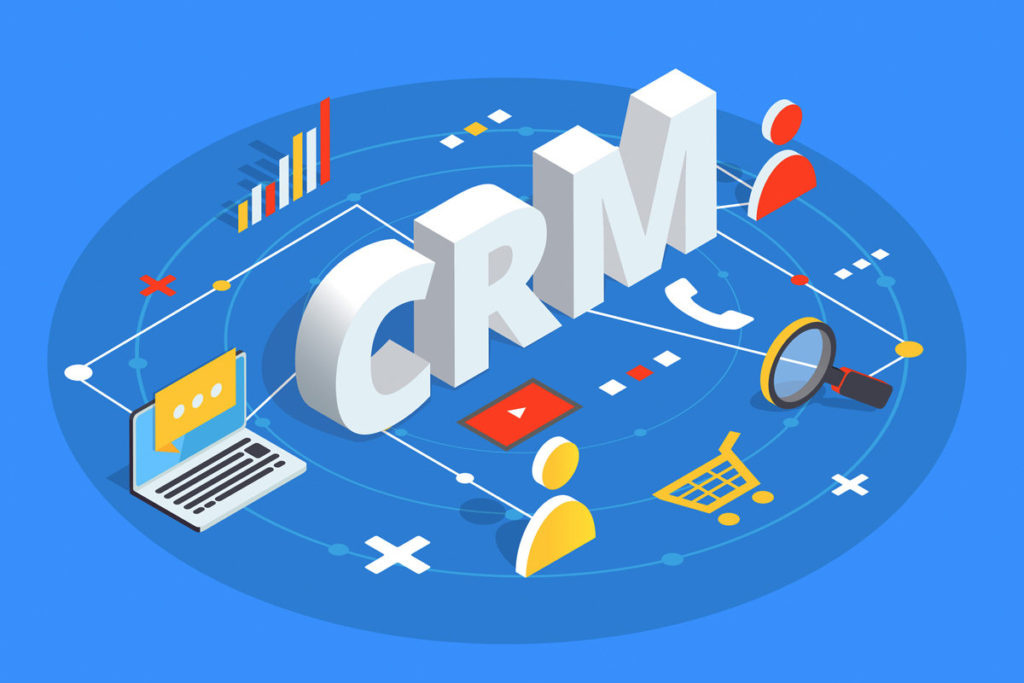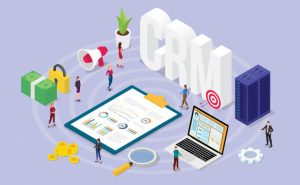
What is a CRM solution?
Customer Relationship Management software, or CRM, is a program designed to gather all aspects of your customer information in one place. A CRM solution helps your business organize interactions and relationships with customers and prospects alike.
CRM software centralizes all the data pertaining to your current and future customers, so that your team may remain on top of their tasks. Agents will be able to log accounts of customer purchases, calls, emails, chats, support tickets, etc. This way, no detail of a customer’s relationship with your business will slip through the cracks.
CRM solutions are available to accommodate businesses of every size and budget: from a small SaaS subscription-based model to large-scale enterprise installation. Companies both new and established will benefit from using an suitable CRM solution.

This software facilitates cooperation, boosts efficiency, and increases customer satisfaction over the course of their entire life cycle. Read on to find out what the right CRM solution can do for your company.
The advantages of using a CRM solution
For a new business, it might seem nonsensical to invest in Customer Relationship Management software before you even have customers. However, when it comes to regulating customer interaction and lead conversion, spreadsheets won’t cut it for long. Without the proper software, your sales staff will have a harder time following up on leads and staying on top of customers. The worst part is, you won’t even know about the business you’re missing out on.
For an established company, going without a CRM solution is throwing caution to the wind. If your sales team is running into problems and losing efficiency, a CRM can do a great deal to help. Read on to find out what the right software can do.
The foremost advantage of a CRM solution is that it accompanies your sales team throughout the entire process of acquiring a lead, converting it into a customer, and closing subsequent opportunities. It’s right there in the name: a CRM will streamline the management of customer relationships.
If your sales team needs help being better organized and working as a unit, then a CRM can help as well. If your team works as a group on a certain project, or if certain members handle different parts of a chain, then coordinating tasks can be difficult. The right CRM solution can let you program customer-related tasks, and assign them to members of your team. This way, every sales person has a defined role and clear objectives. No sales opportunity will go ignored, and no one on your team will be left hanging.
Centralize customer information
A CRM solution will keep customer information in individual files. These files can be fleshed out with fresh data with each new development of your relationship with a customer. Every phone call, email, contract, offer, etc. will be kept in one convenient place. Your whole team will be able to access this information and update it, so that everyone stays on the same page. This will save your team both time and effort, since they won’t have to scramble to access a client’s file in a pinch.
Moreover, centralizing and digitalizing sensitive customer information is more secure than keeping paper files. Storing data on the cloud means that it will be accessible to your team from anywhere in real-time, so long as they have an internet connection. Most SaaS CRM providers include regular backups of your data, thus being proactive in the case of disaster recovery. Moreover, your files are less likely to be misplaced, lost, or accidentally destroyed if they are digitalized: the cloud is much more secure than most realize.
Lastly, your CRM solution can be integrated with the rest of the software your business uses on a daily basis. Consequently, you can keep track of support tickets, phone calls, live chats, emails for each client, right in their files. You can cross-reference with your calendar to schedule appointments and stick to deadlines. This allows your team to refer to their CRM for direction, since both your customers’ information and your team’s schedules are gathered in a single interface.
Accompany the customer journey
In your CRM, you will be able to plan your course of action. Rather than rely on a spreadsheet, planner, or (god forbid) a rolodex, a course of action can be laid out every step of the way. This will allow your sales team to focus on closing, rather than expending time doing paperwork.
Your CRM will allow you to easily identify and follow up on promising leads. It will keep track of the process of signing a new customer so the latter’s specific information is available to the whole team, both sales and support. It will remind you to stay in contact with a customer at regular intervals to encourage product adoption and stay on top of solved support tickets. Lastly, monitoring a customer’s involvement with your business can help your team identify opportunities for cross- or up-selling, thereby organically growing your business while helping customers succeed.
All of this means getting closer to your customers, being proactive, and keeping your finger on the pulse of individual customers’ needs and expectations in order to better satisfy them. Implementing a CRM solution can drive customer retention and mitigate churn. The entire customer journey is tracked in your CRM solution, visible to your whole team and accessible for reference every time a specific customer gets in touch. Your CRM solution can become the hub around which your entire sales strategy is organized.
Foster inter-departmental cooperation
Since your CRM can gather all types of information, it can be the rallying point for the different departments in your company. Coordinating sales, support, marketing, and development is a tricky affair, and without smooth cooperation between those teams, the customers are the ones to suffer and churn.
Lack of inter-departmental cooperation is the source of many pain points for customers. You can use a CRM solution both to assign tasks and see how those tasks fill out the bigger picture. Thanks to a common interface, everyone can access and add to the information in your CRM. Consequently, you can empower your staff to work collaboratively rather than concurrently, by sharing insight, leads, issues, and solution.
Moreover, sharing information, goals, and incentives across your teams improves productivity and efficiency. With the right CRM solution, you can avoid siloing information and help disparate departments work like a well-oiled machine.
How to pick the right CRM solution
The benefits of implementing a CRM solution for your business are clear. However, picking the right solution for your business requires some planning.
What are your goals?
Pinpointing what you hope to accomplish out of installing a CRM solution is the first step to making the most of your new software. Without defining what success will look like for your business, you won’t know how to evaluate your own usage and performance, and run the risk of missing the first for the trees.
These possible goals are a good start to outlining what your ideal outcome might be. Do you wish to:
- Improve your customer service?
- Reduce customer churn?
- Keep your data secure?
- Better understand and refine your sales process?
- Help your team become better organized and more efficient?
- Allow your team to work remotely?
- Develop a more effective lead generation strategy?
Having definite short- and long-term goals and objectives will help you select the right software, then use it to your advantage.
What will this CRM solution cost in both time and money?
Depending on the volume of your data, the size of your team, your security requirements, and your sales process, your CRM solution could take up to a year to implement.
If your concern is to be up and running quickly, SaaS CRM software providers can be set up in minutes, and made to accommodate your entire team. You can add and remove users easily, and pay only for what you use. Heavier enterprise CRM software models take longer to install, and require a larger investment of funds.
No matter which model you choose, it’s important to keep in mind the goals you pinpointed in the previous step. The best CRM solution is the one which will help your business grow and succeed.
Will it provide the insight you need?
In accordance with the objectives you’re aiming for, your CRM solution needs to provide the right data for you to draw meaningful conclusions.
CRM software comes with different levels of customisation. Perhaps one solution will fit you right out the box, perhaps you will need to tweak it.
Consider the following:
- Will this software allow salespeople to work the way you want them to?
- Will this software track the objectives which you have deemed important?
- Does this software mesh well with your specific sales funnel?
- Does it take into account all the customer information you consider relevant?
- Will it allow you to monitor your performance with the right perspective (per salesperson, per customer, per product, etc.)?
- Will this software grow with your business and its goals?
It is easy to use?
In the end, your team members are the ones to get the most use out of your CRM solution, so it needs to suit them well.
